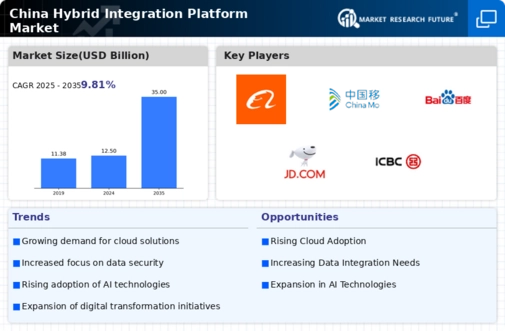Rising Cloud Adoption
The hybrid integration-platform market in China is experiencing a notable surge due to the increasing adoption of cloud technologies. Organizations are migrating their operations to cloud environments, which necessitates seamless integration between on-premises systems and cloud applications. This trend is reflected in the market data, indicating that the cloud services market in China is projected to reach approximately $50 billion by 2025. As businesses seek to enhance operational efficiency and reduce costs, hybrid integration platforms become essential for ensuring smooth data flow and interoperability across diverse environments. The demand for these platforms is likely to grow as enterprises recognize the need for flexible and scalable solutions that can adapt to their evolving IT landscapes.
Digital Transformation Initiatives
The hybrid integration-platform market is significantly influenced by the ongoing digital transformation initiatives across various sectors in China. Enterprises are increasingly leveraging digital technologies to enhance customer experiences and streamline operations. This shift is driving the need for integration solutions that can connect legacy systems with modern applications. According to recent studies, over 70% of organizations in China have initiated digital transformation projects, which often require robust integration capabilities. As companies strive to innovate and remain competitive, the hybrid integration-platform market is likely to see sustained growth, as these platforms provide the necessary tools to facilitate seamless integration and data exchange.
Regulatory Compliance Requirements
In the context of the hybrid integration-platform market, regulatory compliance is becoming increasingly critical for organizations operating in China. With the implementation of stringent data protection laws, such as the Personal Information Protection Law (PIPL), companies are compelled to adopt integration solutions that ensure compliance with these regulations. This has led to a heightened demand for hybrid integration platforms that can facilitate secure data handling and reporting. Market analysis suggests that organizations investing in compliance-related technologies are likely to see a 20% increase in operational efficiency. As businesses navigate the complexities of regulatory frameworks, the hybrid integration-platform market is positioned to benefit from this growing focus on compliance.
Increased Focus on Customer Experience
The hybrid integration-platform market is also being propelled by an increased focus on enhancing customer experience among businesses in China. Organizations are recognizing that seamless integration of various customer touchpoints is crucial for delivering personalized services. This shift is driving the demand for hybrid integration solutions that can unify data from multiple sources, enabling a 360-degree view of the customer. Industry expert's suggest that companies prioritizing customer experience initiatives are likely to see a 15% improvement in customer satisfaction scores. As businesses strive to differentiate themselves in a competitive landscape, the hybrid integration-platform market is expected to flourish, providing the necessary tools to enhance customer engagement and loyalty.
Growing Demand for Real-time Data Processing
In the hybrid integration-platform market, the demand for real-time data processing is becoming a pivotal driver. As businesses in China increasingly rely on data-driven decision-making, the ability to process and analyze data in real-time is essential. This trend is particularly evident in sectors such as finance and e-commerce, where timely insights can significantly impact performance. Market data indicates that the real-time analytics market in China is expected to grow at a CAGR of 25% through 2025. Consequently, hybrid integration platforms that support real-time data integration and analytics are likely to gain traction, enabling organizations to respond swiftly to market changes and customer needs.
















